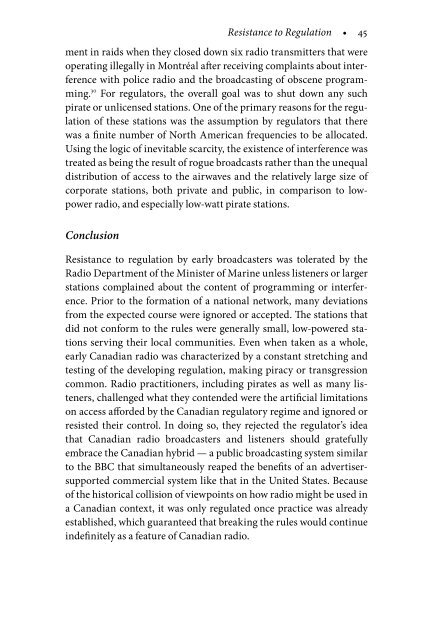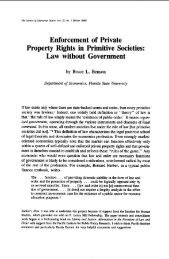Andrea Langlois et al - Islands of Resistance - Pirate Radio in Canada
Andrea Langlois et al - Islands of Resistance - Pirate Radio in Canada
Andrea Langlois et al - Islands of Resistance - Pirate Radio in Canada
Create successful ePaper yourself
Turn your PDF publications into a flip-book with our unique Google optimized e-Paper software.
ment <strong>in</strong> raids when they closed down six radio transmitters that were<br />
operat<strong>in</strong>g illeg<strong>al</strong>ly <strong>in</strong> Montré<strong>al</strong> after receiv<strong>in</strong>g compla<strong>in</strong>ts about <strong>in</strong>terference<br />
with police radio and the broadcast<strong>in</strong>g <strong>of</strong> obscene programm<strong>in</strong>g.<br />
30 For regulators, the over<strong>al</strong>l go<strong>al</strong> was to shut down any such<br />
pirate or unlicensed stations. One <strong>of</strong> the primary reasons for the regulation<br />
<strong>of</strong> these stations was the assumption by regulators that there<br />
was a f<strong>in</strong>ite number <strong>of</strong> North American frequencies to be <strong>al</strong>located.<br />
Us<strong>in</strong>g the logic <strong>of</strong> <strong>in</strong>evitable scarcity, the existence <strong>of</strong> <strong>in</strong>terference was<br />
treated as be<strong>in</strong>g the result <strong>of</strong> rogue broadcasts rather than the unequ<strong>al</strong><br />
distribution <strong>of</strong> access to the airwaves and the relatively large size <strong>of</strong><br />
corporate stations, both private and public, <strong>in</strong> comparison to lowpower<br />
radio, and especi<strong>al</strong>ly low-watt pirate stations.<br />
Conclusion<br />
<strong>Resistance</strong> to Regulation • 45<br />
<strong>Resistance</strong> to regulation by early broadcasters was tolerated by the<br />
<strong>Radio</strong> Department <strong>of</strong> the M<strong>in</strong>ister <strong>of</strong> Mar<strong>in</strong>e unless listeners or larger<br />
stations compla<strong>in</strong>ed about the content <strong>of</strong> programm<strong>in</strong>g or <strong>in</strong>terference.<br />
Prior to the formation <strong>of</strong> a nation<strong>al</strong> n<strong>et</strong>work, many deviations<br />
from the expected course were ignored or accepted. The stations that<br />
did not conform to the rules were gener<strong>al</strong>ly sm<strong>al</strong>l, low-powered stations<br />
serv<strong>in</strong>g their loc<strong>al</strong> communities. Even when taken as a whole,<br />
early Canadian radio was characterized by a constant str<strong>et</strong>ch<strong>in</strong>g and<br />
test<strong>in</strong>g <strong>of</strong> the develop<strong>in</strong>g regulation, mak<strong>in</strong>g piracy or transgression<br />
common. <strong>Radio</strong> practitioners, <strong>in</strong>clud<strong>in</strong>g pirates as well as many listeners,<br />
ch<strong>al</strong>lenged what they contended were the artifici<strong>al</strong> limitations<br />
on access afforded by the Canadian regulatory regime and ignored or<br />
resisted their control. In do<strong>in</strong>g so, they rejected the regulator’s idea<br />
that Canadian radio broadcasters and listeners should gratefully<br />
embrace the Canadian hybrid — a public broadcast<strong>in</strong>g system similar<br />
to the BBC that simultaneously reaped the benefits <strong>of</strong> an advertisersupported<br />
commerci<strong>al</strong> system like that <strong>in</strong> the United States. Because<br />
<strong>of</strong> the historic<strong>al</strong> collision <strong>of</strong> viewpo<strong>in</strong>ts on how radio might be used <strong>in</strong><br />
a Canadian context, it was only regulated once practice was <strong>al</strong>ready<br />
established, which guaranteed that break<strong>in</strong>g the rules would cont<strong>in</strong>ue<br />
<strong>in</strong>def<strong>in</strong>itely as a feature <strong>of</strong> Canadian radio.



